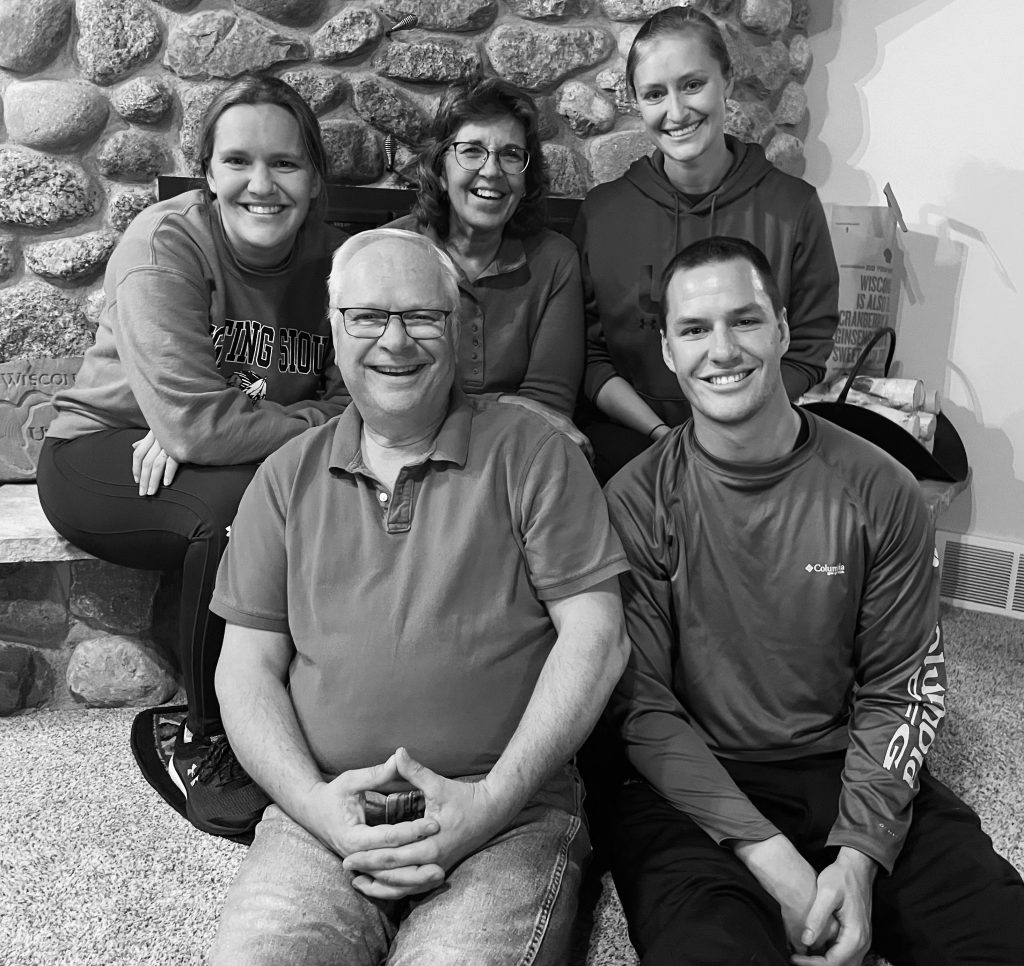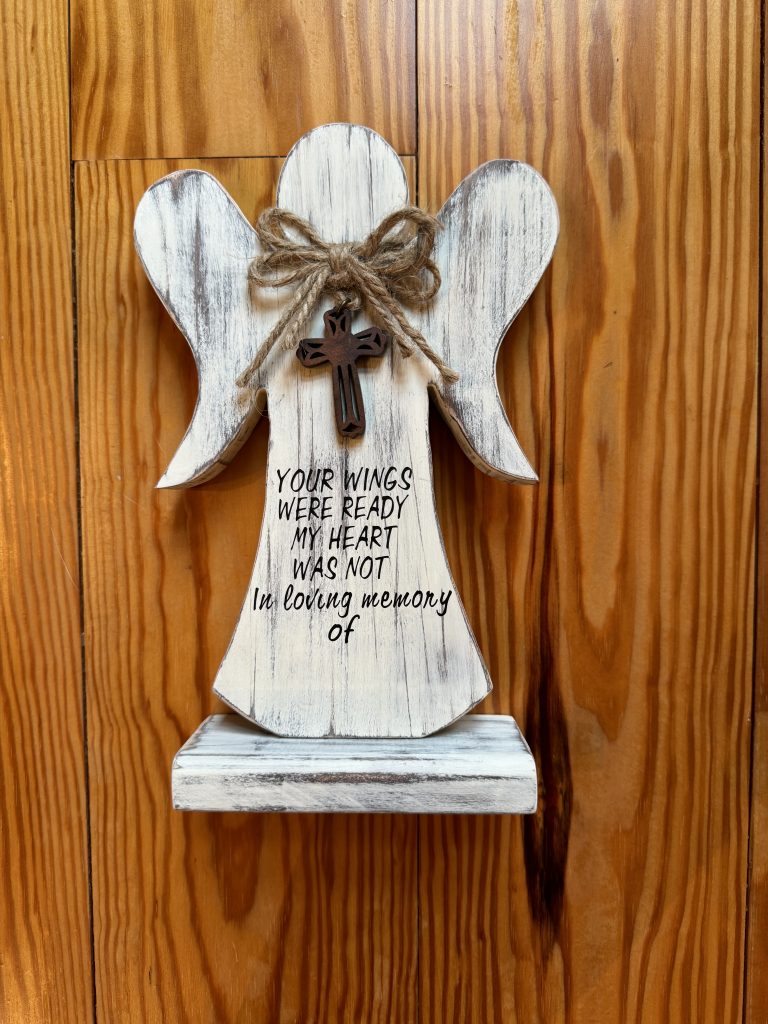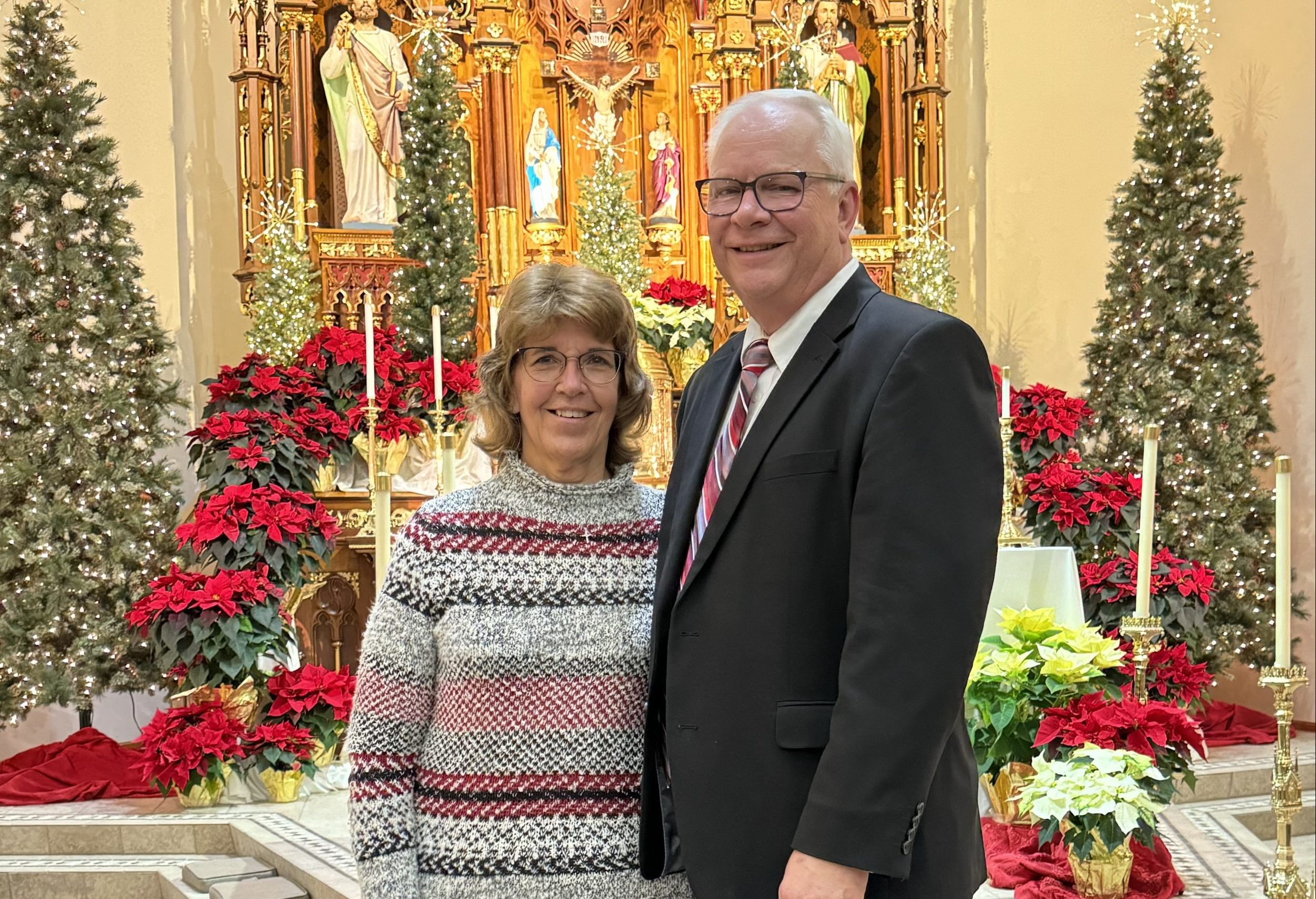St. John the Baptist’s bereavement ministry offers compassion and support to those navigating loss
Like most people, Laurel Rudolph-Kniech of St. John the Baptist Church in Marshfield has had to confront death and grief in her life. While on vacation, she had an inspirational moment that led her to feel called to assist families in her parish as they navigate life after the loss of their loved ones.
The Holy Spirit Calls
A Mass announcement about a bereavement ministry at St. William Catholic Church in Naples, Fla., caught the attention of Laurel and her husband, Jim. Coming out of church after Mass, Jim said to Laurel, “You need to do this.” She had the same thought and felt blessed for his support.
Laurel saved the church bulletin and, upon returning to Wisconsin, did further research to determine if a similar ministry existed in the area. If not, she considered potential further steps in coordination with her pastor, with a goal of assisting families in all the stages following the death of a loved one.
The idea of walking with a family during this time resonated with Laurel. “The loss of a loved one is a very emotionally and spiritually challenging time,” says Laurel. “The actual funeral service can seem like a process, and when a loved one is laid to rest, family and friends return to their routine, but the journey does not end at the burial.”
Upon reflection and drawing from her Leader of Prayer training, Laurel realized her parish could help guide parishioners through the grieving process. Providentially, Laurel’s charisms of planning and organizing helped her develop a rough draft of a plan to implement the ministry.
“I reached out to our pastor at the time, Father Sam Martin,” explained Laurel. “He was very open to the idea and shared how such a ministry could be a distinct asset for the community of faith.”
With Father Martin’s assistance and encouragement, a bereavement ministry team was established. The group has collaborated with three pastors to support those who have experienced loss in their families.

“We have served almost 200 families since its formation,” Laurel says. “I am very fortunate to have been blessed with three pastors and associates who have been extremely supportive and provided additional opportunities for growth.”
A guidebook was created to help families understand the different aspects of the Christian Rite of Burial. It contained the appropriate readings for the funeral Mass or service, a planning sheet for the priest and simple Scripture readings and prayers that a bereavement minister could use when contacting a family.
Father Jim Weighner, who succeeded Father Martin at St. John the Baptist, suggested providing the book “Through Death to Life: Preparing to Celebrate the Funeral Mass” by Joseph M. Champlain. The bereavement ministry contacted the local funeral home staff, who were very supportive. Now, the funeral home provides the book to families when they meet for the funeral planning process.
The information is also available online, allowing out-of-town family members to more easily participate in the process.
The Funeral Mass
Families who are hesitant to take on liturgical roles during the funeral Mass receive support from the bereavement team. “If they do not have anyone to read or feel uncomfortable, we often serve as the lector,” says Laurel.
Bereavement team members may also serve as eucharistic ministers or help fulfill special requests. Sometimes the role is simply to serve as a liaison for communication.
Laurel remembers one family in the parish who wanted to honor their mother, Ruth, by having a reading from the Book of Ruth during her funeral Mass. Knowing that this is not one of the prescribed readings, Laurel reached out to the presiding priest to get approval.
Many times, the pastor has multiple funerals during the week and is unable to spend as much time as he would like to assist the family. The bereavement team steps in to support families when they need that special care.
Continued Care
After the funeral, families are often left to navigate their grief alone. Knowing this, the St. John the Baptist bereavement team stands ready to offer support.
“I strongly believe the Holy Spirit has called me to this ministry and is present when I follow up with families,” says Laurel. “There is no defined time as to when a minister reaches out after the funeral service—sometimes the family needs assistance weeks or months later.
Laurel has a friend who creates personalized memorial gifts such as wind chimes, lanterns and angels with a reflective message that includes the deceased person’s name.
“It’s not the physical memorial that is most important; it is the opportunity to reach out to families,” she explains.
Laurel brings the gift to the family and asks if the family needs any assistance. Sometimes, all that is needed is a conversation—the opportunity for the surviving spouse, child or parent to talk about their loved one.
“Many of these individuals are often alone,” Laurel explains. “They need to share their stories. Each person is unique, and our elderly have so many years of life experiences and wisdom. We have forgotten the art of listening. It’s important to listen more attentively.”
Laurel has toured homes during bereavement visits to see the handiwork of the deceased. Sometimes, the process just requires sharing a beverage and conversation, but every now and then, there is a little more to it.
In a follow-up call to a woman in her late 90s, who had been widowed after her 103-year-old husband passed away, Laurel asked how she could help. The woman responded by asking if Laurel knew how to dig potatoes.
Without hesitation, Laurel arrived with a garden fork and happily began digging potatoes. The woman found it easier to share her memories with Laurel as they worked together side by side in the dirt.
Laurel brings her husband, Jim, along to help those needing minor home repairs or maintenance. During these simple acts of service, grieving individuals often open up, sharing stories of their loved ones. In these moments, they find comfort, no longer feeling alone in their grief or abandoned in the world.
A Yearly Remembrance
Each year, in conjunction with All Souls Day in November, the parish hosts a Mass or prayer service to remember deceased parishioners from the previous year. Personal letters are sent to each family, inviting them to the prayer service, which will be held this year on Saturday, Nov. 2 at 6:30 p.m. and celebrated by Father Thelen.
“We read the names of all the deceased from the past year,” explained Laurel regarding the format. “After the service, we have snacks and beverages, which provides an opportunity to socialize. It’s a great way for everyone to gather together in a faith-based environment.”

On the one-year anniversary of their loved one’s death, families receive a card from the parish that includes a personal note from the pastor. This is a reminder that they and their loved one remain in the faith community’s prayers.
The personal attention from the St. John the Baptist bereavement team has made a positive impact on the families coping with loss.
“We receive many thank you cards,” Laurel says.
One secret to the team’s success is a caring and cohesive group of people. Laurel regularly hosts social events at her home with the bereavement ministers and priests to build a sense of community and support within the group.
“We feel more spiritually blessed in what we receive than what we are giving to families,” says Laurel. “Many of the bereavement ministers have been part of the St. John the Baptist faith community for a very long time, so they may be close friends with the families who have lost a loved one.”
Expanding the Ministry
Laurel considered what would be beneficial for families facing the impending loss of a loved one receiving treatment or end-of-life care in the hospital or local hospice. “We didn’t have any faith-based support group,” she says. “There’s a very good program on grief support groups from the Archdiocese of Detroit called “Seasons of Hope.”
In discussion with Father Thelen and the bereavement team, they felt that a similar, but less formal program could benefit the local faith community. First, Laurel created a tri-fold brochure introducing the support groups offered. Information has been shared through the church bulletin, hospital chaplain service and local funeral homes.
“We have several support groups available for different types of losses,” explains Laurel. “We provide a group for families who have experienced the loss of an infant or young child, another group for those who have lost a loved one, a group for individuals caring for a loved one with an illness like dementia or Alzheimer’s and a group for families who have lost a loved one to suicide. These support groups are faith-based and offer a Catholic environment for people to connect with others and share their experiences with the support of their church community.”
The Work of Bereavement Ministers
According to Laurel, the success of the St. John the Baptist bereavement ministry comes down to a cohesive and caring team of parishioners. “I am definitely not the mastermind behind this,” says Laurel. “I have been blessed with pastoral support and like-minded peers who share the mission of this ministry. The personal, spiritual and faith rewards are amplified by our work.”
Laurel acknowledges that working with a family for the first time can be nerve-wracking, as it requires being open about one’s faith. Despite facing difficult challenges, she views bereavement ministry as a meaningful way to journey with families and demonstrate the strength of their faith community.
During the planning and celebration of each funeral Mass or service, the parish provides great comfort to families and friends through the work done by the bereavement ministry. This support is offered at a time when they need to feel God’s care and love. “No one is alone and we remind them of God’s endless presence,” says Laurel.
Laurel has created a brief outline for bereavement ministers to follow. However, during training, she emphasizes the importance of trusting how the Holy Spirit guides them in their work with families. “There are no correct answers,” she says. This is a ministry where there are guidelines but no rules because the Holy Spirit is going to interact as needed. Every death and every mourning process is unique.”
Laurel’s Path to Ministry
Laurel’s Catholic faith helped her navigate the passing of her father, mother and siblings. Further fortifying her faith is Laurel’s 15 years as a Benedictine oblate, which has strengthened her faith and guided her in many ways, including initiating the bereavement ministry.
“The prologue from Benedict’s Rule is always at the forefront of my mind,” says Laurel. It reads:
Listen, O my son, to the precepts of thy master, and incline the ear of thy heart, and cheerfully receive and faithfully execute the admonitions of thy loving Father, that by the toil of obedience thou mayest return to Him from whom by the sloth of disobedience thou hast gone away.
Her approach centers on listening with “the ear of the heart.” When teaching medical students and residents, she emphasizes the importance of truly hearing a patient’s concerns, as these often hold the key to the diagnosis, even if it is not expressed in medical terms.
Her faith is integral to her work, both as a team physician and as medical director for several WIAA State competitions. Prayer forms the foundation of her life and guides her actions, even in her professional duties.
“People see me making the sign of the cross after the national anthem at a sporting event,” Laurel says. “It’s a simple prayer for all athletes and officials to remain uninjured throughout the competition. I love my role as a team physician and hope for injury-free competitions where I can carry my medical bag back to the truck unopened. If an athlete needs emergency care, I always ask their families if I can pray with them quickly. I invite the Holy Spirit to guide my prayers.”
Looking to the Future
While establishing a strong foundation, Laurel eagerly anticipates expanding the bereavement ministry in her community and parish, recognizing that the Holy Spirit guides this work.
“I feel there is so much more we can accomplish. We have leaders of prayer in this community, and they have been commissioned to serve in additional ways,” says Laurel. “Every single human being has something to share. We just need to know how to hear it. Sometimes it is not audible; we must listen with our heart.”
Story by Mary Kay McPartlin
Published in the November/December 2024 issue of Catholic Life Magazine

